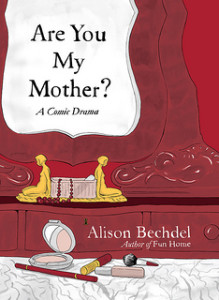

Bechdel imagines the two crossing paths on that very day in a beautiful series of pages that show just how masterfully she has developed her ability to fuse drawing and diagram in a visual poetics of thought.īechdel's superbly flexible and eloquent images have only got better since Fun Home, which is fortunate given that Are You My Mother? contains some dramatically unpromising material. The young Winnicott's analyst had his office a block away. Woolf got the idea for that novel while "walking round Tavistock Square". Bechdel feels that until she can get her mother "out of my head" the two women can never truly know each other, and that an exorcism of this kind is exactly what Woolf achieved by writing To the Lighthouse. Winnicott held that infant and mother regard each other as mirror image – a replica of the self that is at the same time inaccessible. Two mirrors faced each other in the foyer, creating an infinite regression of images of whoever happened to be standing in the little room. The key image of Are You My Mother? comes toward the end of the book, but is pulled from the beginning of Bechdel's life, all the way back in her father's monstrous mansion. ("I want him to be my mother," cartoon Alison says.) The concepts Winnicott contributed to object relations theory (the "good enough" mother, transitional objects, the true and false self, etc) provide themes for each of the book's seven chapters, but its swirling, circular structure derives from Woolf.Īs Bechdel recollects her childhood, her love affairs, her interactions with two different therapists and, throughout it all, her efforts to get the recognition she has always craved from her mother, her account loops in and out of itself chronologically. The presiding genii of this particular work include Adrienne Rich, Sigmund Freud, Alice Miller and, above all, Virginia Woolf and the British psychoanalyst DW Winnicott. Like all of Bechdel's work, Are You My Mother? is furiously literary, full of citations and quotations, and crafty symbolic parallels to the books its author is so often depicted reading with furrowed brow. (She doesn't think much of memoir as a genre: "I just don't know why everyone has to write about themselves.")

Now, Are You My Mother? scrutinises Bechdel's relationship with her other parent, a woman not only still alive but also on hand to offer comment. After Bechdel came out to her parents at 19, she learned her father had a history of secret homosexual affairs, the revelation of which may have been behind his death in a traffic accident a few weeks later.

He devoted most of his time, however, to lovingly restoring and furnishing the family's enormous old Victorian house. Fun Home described Bechdel's rather gothic childhood in small-town Pennsylvania, where her father worked as both high-school English teacher and funeral home director.


 0 kommentar(er)
0 kommentar(er)
